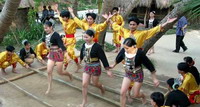| Buddhists call for protection of intangible heritage |
Buddhist experts attending the World Buddhist Forum called for enough attention to the protection and inheritance of the intangible Buddhist heritage. "Buddhist culture is an important part of the intangible cultural inheritage in China," said Tian Qing, director of the research center for religious arts in the Chinese National Academy of Arts. Tian said that Buddhist culture has a significant and profound impact on the forming of national character, behavior, aspirations and way of life. Tian said 41 items related to Buddhist culture falling into 18 categories have been listed in the first and second batch of the national intangible cultural heritage, which were released by the Ministry of Culture in 2005 and 2008 respectively. These items include folk literature, traditional music and folk dance and drama. "The Jing music in the Beijing Zhi Hua Temple dates back 500 years," said Tian Qing, "It is considered a living example of ancient Chinese music. "It not only consoles the followers of Buddhism, but also provides vivid evidence for the nature.... of traditional culture." There are many items of intangible Buddhist heritage, like the Jing music, throughout the country. Shaolin Kung Fu, a school of martial arts associated with the monks of the Shaolin Temple based in central China's Henan Province, was another. But the items already on the intangible Buddhist heritage lists were not enough, compared with the Buddhism's huge influence on Chinese culture. Tian believed Buddhist heritage extended to categories like the followers customs and rituals performed during festivals. "The Buddhist stories, architecture and adornments and Buddhist medicine can all be potential items," Tian added. Tian and other experts present called for concerted action from the government at all levels, the Buddhist community, the cultural circle and ordinary people to safeguard and pass on intangible Buddhist heritage. |
|

